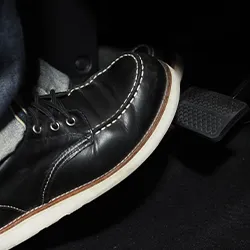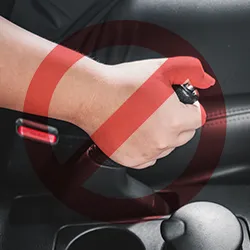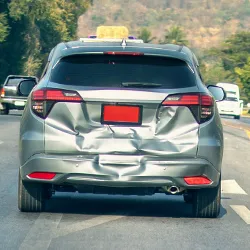Quick Summary
- Brake checking is an illegal action. It’s a common cause of rear-end accidents and can cause vehicle damage and motorist injuries.
- You should hire an accident attorney to help prove fault in a brake check vehicle accident.
- It’s a common misconception that the rear-end driver is at fault for a brake check accident. Both drivers can be partially responsible, and the law will determine the damages they must pay.
What is Brake Checking?

This prompts the other driver to brake sharply as well.Brake checking is seen as aggressive driving.
Some people do it for fun when people they know, such as family and friends, are driving behind them.
Others want to shock the driver behind them or check tailgaters. People also brake check to try to make the other driver slow down or avoid an accident.
A brake check is seen as a road rage incident and reckless driving.
Brake testing or brake checking is a phrase often heard in motorsport, but can be applied to the road, too. A brake test is when a driver ahead of you deliberately and unnecessarily brakes hard in order to force you to take evasive action or to cause you to run into the back of them. It is used in road rage incidents or when the driver in front is trying to commit insurance fraud- Driving Tests
Often, the rear driver is the one who’s blamed for the rear-end collision, especially if they drive too close to the vehicle in front. In that case, this driver is seen as a tailgater.
As this is aggressive driving, it can cause property damage, and personal injury, such as:
- Whiplash
- Back and spinal injury
- Soft tissue damage
- Brain injury
Legal Implications of Brake Checking in Different States
The legal ramifications of brake checking can vary significantly from state to state.
Here’s how different jurisdictions approach this dangerous behavior:
1. California
In California, brake checking can be classified as aggressive driving or road rage. If an accident occurs due to brake checking, the driver who initiated the action may be liable for damages [1].
California follows a comparative negligence rule, meaning that both drivers can share liability based on their actions leading up to the accident.
2. Texas
Texas law treats brake checking as a form of reckless driving.
If a driver intentionally brake checks another vehicle and causes an accident, they may face civil liability for damages incurred by the other party.
Additionally, if the act is intentional, it could lead to criminal charges.
3. Florida
In Florida, brake checking can result in severe penalties, especially if it leads to an accident.
Florida has strict laws against aggressive driving, and offenders may face fines and points on their driving record.
Victims of brake-checking accidents can sue for damages, including medical expenses and lost wages.
4. New York
New York law views brake checking as a form of road rage that can result in criminal charges if it leads to reckless endangerment or injury.
Drivers who engage in this behavior may also face civil lawsuits from victims seeking compensation for damages.
2 Real-World Examples of Brake Checking Incidents
Brake checking can lead to dangerous situations and legal consequences. Here's how two real-life cases unfolded:
Case Study 1: The Tailgater Incident
In a notable case in California, a driver engaged in brake checking after feeling tailgated on a busy freeway.
The sudden stop caused the following vehicle to collide with the rear of the brake-checking car. The driver who initiated the brake check was found liable for damages due to reckless driving behavior.
Case Study 2: The Family Prank Gone Wrong
In Texas, a family member jokingly brake-checked another relative while driving on a rural road. The sudden stop resulted in a serious accident that caused injuries to both parties.
The driver who performed the brake check faced civil penalties and was held responsible for medical costs due to negligence.
Is Brake Checking Illegal?

According to the National Highway Transportation Safety Administration, rear-end car accidents present 29% of all car accidents, making them one of the most common vehicular incidents [2].
It’s also illegal to break check a tailgater. While tailgating is annoying and unlawful, you can’t brake-check another driver.
If you have a tailgater, you should pull over, switch lanes or maintain the speed you’re going at, and then change lanes when it’s safe.
Also, if you brake-checked a tailgater, you’ll be responsible for the car accident. If you live in a comparative fault state, you could pay for part of the tailgater’s damages.
Also Read: California Rear-End Accident Laws
How to Prove Brake Checking?

But in most cases, proving the other driver brake-checked you is difficult.
A dash cam is your best bet to prove innocence in a rear-end accident.
If you don’t have a dash cam, consider getting one, as video footage is concrete evidence of who is the brake-checking driver and, thus, at fault for the car accident.
You can also ask for surrounding personal home cameras to check if they recorded the brake check. Apart from videos, get witness statements of the auto accident.
See if someone agrees that the other motor vehicle suddenly stopped in front of you or that the driver had no reason to stop suddenly but still did it.
Also, some drivers get very angry after a rear-end accident. If this happens, you can record them, as perhaps you can get an admission of guilt and win the case.
Brake checks are always done on purpose, regardless of the circumstances, so at least one driver must be at fault.
Related Article: Is It Illegal To Eat While Driving?
Brake Checking Accident Claims

Either driver can be the at-fault driver, especially if careless driving is involved or an aggressive tactic.
For example, the rear driver can suffer serious injuries and property damage in a brake-checked accident case.
Then, this driver can sue the brake checker (the driver at the front) for damages.
The law enforcement will check several factors related to a brake check claim, such as:
- If the brake checking was intentional — For example, to commit insurance fraud.
- If sudden braking was a threat to the other driver.
- If the brake check caused fear, severe injuries, and property damage to the other driver.
Insurance companies often try to reject liability for the car accident claim, and they cite exclusion in the contract because of intentional conduct.
For a successful personal injury case against brake checkers, you need an experienced attorney who can file a personal injury lawsuit and deal with the insurance company.
What Should You Do in Case of a Brake Checking Accident?

- Remain calm — Try to stay calm even when faced with aggressive drivers, and don’t get into any disputes.
- Contact law enforcement — Call 911, and in case of your or other drivers’ injuries, ask for an ambulance.
- Gather information — Exchange contact and insurance information with the other driver, take photos of the crash, and get witness contact information as well.
- Seek medical help — Even if you don’t see a serious injury, you should go to the hospital to get checked out. This way, you’ll have a copy of the medical records for the insurance claim.
- Hire a personal injury attorney — The attorney can ask for police reports and help you gather evidence for the car accident claim.
Prevention Techniques for Avoiding Brake-Checking Situations
To minimize the risk of encountering or being involved in a brake-checking incident, consider these prevention techniques:
- Maintain Safe Following Distance: Always keep a safe distance between your vehicle and the one in front. This gives you ample time to react if the lead driver suddenly brakes.
- Stay Calm: If someone tailgates you, avoid retaliatory actions like brake checking. Instead, safely change lanes or pull over when possible to let them pass.
- Use Your Turn Signals: Communicate your intentions clearly by using turn signals well before any lane changes or stops.
- Avoid Aggressive Driving Behaviors: Be mindful of your driving habits and avoid engaging in aggressive behaviors that could provoke other drivers.
- Educate Others: Share the dangers and legal implications of brake checking with friends and family to promote safer driving practices.
- Report Dangerous Drivers: If you encounter someone exhibiting aggressive driving behaviors such as frequent brake checking, report them to local authorities when safe.
By understanding the implications of brake checking and employing preventive measures, drivers can contribute to safer roads and reduce the likelihood of accidents caused by aggressive driving behaviors.
FAQ
1. Is Brake Checking Illegal?
Yes, brake checking is illegal because it is viewed as a reckless and aggressive driving behavior that endangers others. Engaging in this behavior can lead to accidents and is punishable under traffic laws.
2. What Happens if You Hit Someone Brake Checking?
If you hit someone brake checking, you should check for injuries and get help from an attorney.
3. How Do You Deal with a Tailgater?
The best way to deal with a tailgater when driving is to try to stay away from them. Keep your distance, and stay calm. If you can, switch lanes and get out of the way of the tailgater.
Related Article: 8 Leading Causes of Collisions
Were You a Victim of a Brake Check?
The brake check is illegal, and it’s a common misconception that the driver in the rear is at fault.
People brake check for several reasons, such as to avoid an animal on the road or an accident. However, there are also instances where brake checking is intentional.
No matter the cause, you should get an experienced car accident lawyer. Schmidt & Clark, LLP law firm has dealt with countless brake check accidents, and we can help with your car accident case.
Contact us today to schedule a consultation, and let us help you get the damages due to you.
References:
1.https://commdocs.house.gov/committees/Trans/hpw105-34.000/hpw105-34_0.htm2. https://www.nhtsa.gov/sites/nhtsa.gov/files/analyses20of20rear-end20crashes20and20near-crashes20dot20hs2081020846.pdf

 Published by
Published by